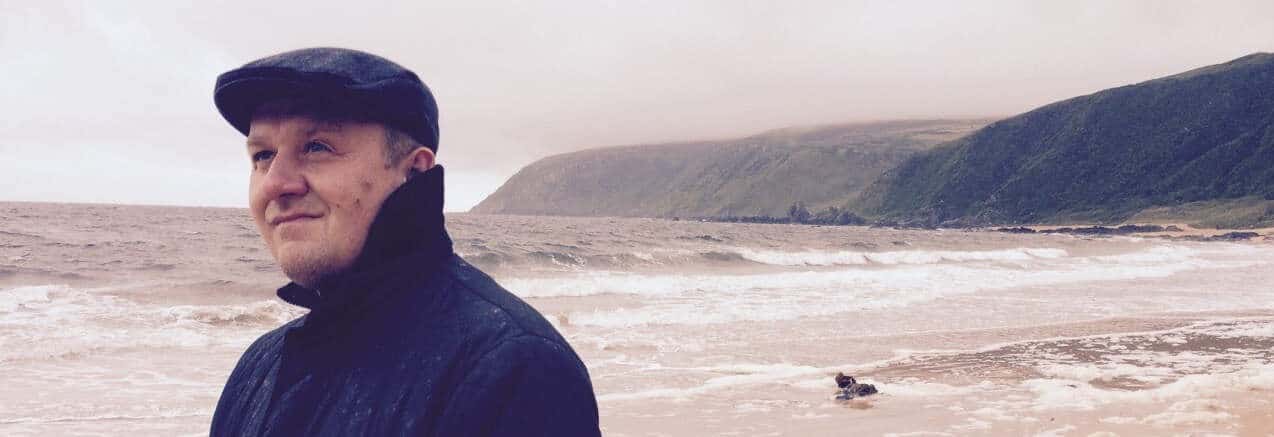
“Calls To Distant Places” is set in Belfast, Ireland. Peter Jordan is an Irish short story writer who spends his time between Belfast & Donegal. His latest collection of short stories, also titled “Calls To Distant Places” was recently published in Ireland. He has won the Bare Fiction prize, placed second in the Fish, and was shortlisted for the both the Bridport & Bath Short Fiction and Flash Fiction prizes.
Peter has kindly agreed to share another story with our American readers to help us all get through the Coronavirus lockdown. Please leave your thoughts in the comment section below. Enjoy.
Calls To Distant Places
It was two in the morning. When I got out of the taxi I saw my neighbor Joe across
the street standing at his front gate. I hadn’t spoken to him in months. His wife had
cancer and my wife had just had a baby.
– Hi Joe, I said.
He motioned to me.
– What’s up? I said.
– It’s Bruno.
Bruno was Joe’s Golden Retriever.
– I came downstairs for a cigarette, it must have been his heart, he’s been on
medication.
I didn’t know what to say.
– I need to get him in the boot of the car. I don’t want Grace to see him. She’s
been through enough already.
We walked together up the slope of the driveway to the house. He opened the
car boot and lifted out his fishing gear. There was a chill and I could see my own
breath.
Joe came out of the garage with black bin liners and arranged them carefully
along the bottom of the boot. When he had finished, I followed him into the house. I
hadn’t been in the house since last summer. When we walked inside, I could smell
synthetic air freshener.
In the living room, the dog was lying on a throw on the sofa.
Joe had really let the place go: on one of the seats, beside the television, was
a pile of old magazines and newspapers. There were ashes and white tissues in the
grate and on the hearth.
Joe got on his knees and cradled Bruno’s head and I tried to lift his hind legs.
He was still warm. Then Joe said: Wait. And he placed the throw over him, and we
lifted him off the sofa in that manner. We carried him carefully through each doorway
to the outside and placed him in the boot of the car. Then Joe bent down and kissed
him on the forehead before finally closing the boot. I patted Joe on the shoulder and
we both went back inside.
In the kitchen he reached up above the grill, opened a cupboard and took out
a bottle of Jameson.
Then he nodded towards the sink. Help yourself to a glass, he said.
As I walked towards the sink, I kicked a bowl of dried dog food. It was half
empty. And I cursed.
– Sorry about the mess, said Joe.
I lifted a glass and rinsed it under the hot tap, running my fingers inside and
along the rim to clean it.
I’d been drinking beer all night and I wasn’t ready for the whiskey. It tasted
earthy. It would take a bit of getting used to. I patted my pockets for my cigarettes,
stood up and offered one to Joe.
– I’m just going to check on Grace, he said. I’m not smoking in the house
anymore.
I heard his weight on the stairs as I patted every pocket for my lighter. When I
found it, I stepped outside on to the patio. The intruder light came on immediately.
I remembered last summer. We had only just moved in. Joe had called at the
door to introduce himself. He had caught two sea trout: a cock and a hen. The male
fish was around four pounds, the female a pound lighter.
He brought me over a generous cut from each fish. My wife, Anna, said she
couldn’t eat them after having just seen them whole. I wrapped them in tinfoil and
cooked them in the oven with just a little olive oil, salt and pepper. They didn’t taste
like farmed fish. These fish, you could taste the river in them.
Anna said we should invite Joe and Grace over for a drink. They both came
over with wine and beer. And, when the sun moved behind our house, we all carried
our drinks across the street to Joe and Grace’s. I remembered Grace carrying her
sandals in one hand and a wine glass in the other.
They were both older than us by twenty years but there was a bond. Grace
really hit it off with Anna. I think in many ways they were very similar — they had a
lot in common.
Joe had said he would take me fly-fishing He gave me a cork-handled
beginner’s rod, showed me how to cast. I had been practicing with that rod; casting
from my patio until I could land the fly on my compost bin. The fishing season had
come and gone — I’d paid £120 for a fishing license — and I hadn’t got to fish.
Joe stepped outside. The intruder light came back on.
– She’s sleeping, he said.
I offered him a cigarette and he accepted. Stood there in a white short-
sleeved shirt he didn’t seem to notice the cold.
– How’s Anna?
– She’s good, I said. Anna’s good.
– And the baby?
– The baby’s good.
– A good sleeper?
I nodded. The truth is I was sleeping in the spare room. I felt like Anna and I
were drifting apart since the baby had come along.
– My son left before you moved in, said Joe. He’s an accountant, lives in
Australia now.
He drained the glass.
– I might visit when things settle down here.
He went back inside for the bottle and, when he came back outside, he asked:
Have you changed a nappy yet?
– Not yet, I said.
– I never changed a single nappy. Grace did it all.
Then he drained the glass, looked up at the sky.
– It’s my turn now, he said.
I lifted the glass, but I didn’t drink from it.
– Joe, I said. I gotta go.
I offered him my hand. He shook it.
– Tell Anna I said hello, he said, and say hi to the baby.
Then he walked me through the house. On the front porch he hugged me, and
he didn’t let go.
– I’m sorry about the fishing, he said.


